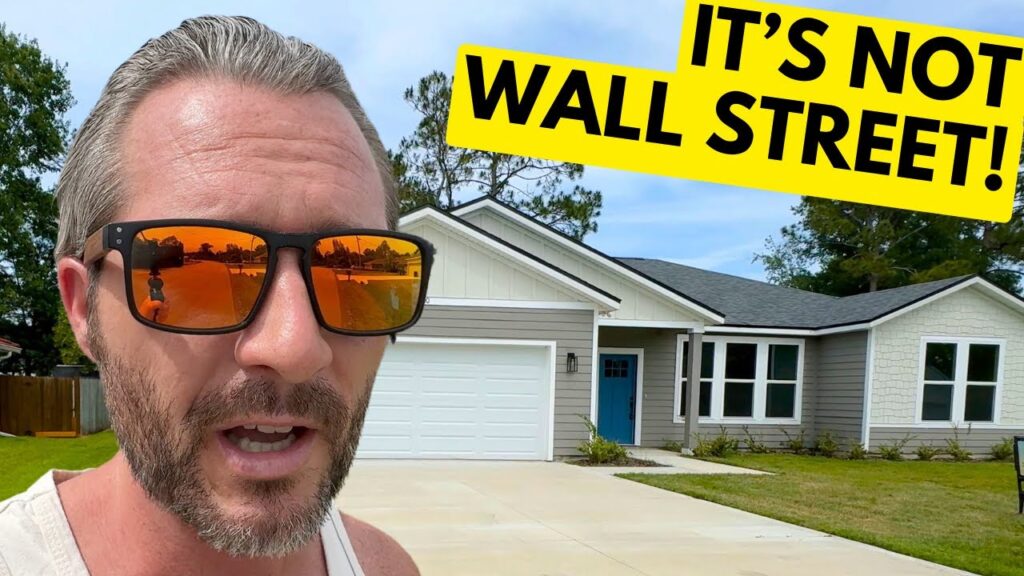The TRUTH BEHIND WHO IS BUYING ALL THE HOUSES…
“The TRUTH BEHIND WHO IS BUYING ALL THE HOUSES…” is a thought-provoking video by Michael Bordenaro that sheds light on the current real estate landscape. The video explores the topic of banning corporations from buying single-family homes and highlights the support this idea has received from viewers in the comments section. Contrary to popular belief, the video reveals that Wall Street makes up only a small portion of corporate homebuyers, while small mom and pop landlords dominate the market. Additionally, the video offers one-on-one calls for further discussions, provides information on filming and editing equipment, and invites viewers to sign up for weekly video updates and cashback rewards through affiliate links.
One thing that the video addresses is the concern over big corporations owning and buying real estate, which has prompted some states to take measures to address this issue. However, the video suggests that the impact of limiting corporate ownership may not be as significant as expected, as small investors play a significant role in buying and owning properties. The narrative also touches on government intervention in housing, the decline in demand for commercial real estate, and the potential problems associated with Airbnb rentals, offering a comprehensive perspective on the dynamics of the real estate market.

States considering banning or limiting corporations from buying single-family homes
At the moment, several states are actively exploring the possibility of banning or imposing restrictions on corporations from purchasing single-family homes. This idea has garnered significant support from viewers who frequently engage in discussions on this topic in the video’s comment section. It is worth noting that while many people associate Wall Street with corporate homebuyers, their involvement in the market is actually quite limited. The majority of single-family homes are purchased by small mom and pop landlords as investment properties. These local investors play a crucial role in the real estate market, and their contributions should not be overlooked.
However, some states are taking measures to address the issue of big corporations owning and buying real estate. Democrat-run states like New York and California are pushing forward initiatives to prohibit or limit corporate homebuying. On the other hand, states such as Ohio and Nebraska, which have a Republican majority, have introduced bills to restrict Wall Street’s ability to purchase homes. These legislative efforts aim to address the concerns surrounding corporate ownership of single-family homes and its impact on the housing shortage.
In addition to legislative action, another tool used to prevent the excessive buying of properties by investors is the implementation of restrictions on rentals by Homeowners Associations (HOAs). While HOAs are often associated with negative connotations, they can serve a beneficial purpose in this context. Some HOAs mandate that properties must be owner-occupied, preventing investors from buying houses solely for rental purposes. Others allow investors but limit the number of properties that can be rented out. These measures help ensure a certain level of owner-occupied housing and prevent investors from monopolizing the market.
Efforts to block big corporations from buying homes, while commendable, may not have as significant an impact as expected. This is because small investors, such as the aforementioned mom and pop landlords, still constitute a significant portion of homebuyers. Data from John Burns Research and Consulting reveals that small investors, who own one to nine properties, purchase more than 15% of all single-family investment properties. Even during the peak years of 2021 and 2022 when 25% of single-family homes were purchased by investors, small investors accounted for a substantial portion of these purchases. Therefore, while legislation targeting corporate homebuyers may be a step in the right direction, it is important to recognize the ongoing influence of small investors in the real estate market.
Government intervention in the housing sector has had mixed results. While some initiatives have successfully addressed certain issues, others have inadvertently created unintended consequences. It is crucial to carefully consider and evaluate potential interventions to ensure that they effectively tackle the problems at hand without causing further complications.
Majority of single-family homes bought by small mom and pop landlords
Contrary to popular belief, the lion’s share of single-family homes in America are purchased by small mom and pop landlords as investment properties. This group plays a crucial role in the real estate market and should not be overlooked. According to data from John Burns Research and Consulting, small investors who own one to nine properties purchase more than 15% of all single-family investment properties. This indicates that they have a significant impact on the housing market, even when compared to corporate homebuyers and larger investors.
The involvement of small investors in the housing market varies depending on their region and the regulations put in place. In some states, HOAs play a significant role in preventing excessive investments by implementing restrictions on rentals. These restrictions could include requiring properties to be owner-occupied or limiting the number of properties that can be rented out. These measures ensure a balance between owner-occupied homes and rental properties in a given community.
It is important to recognize the complexity of the housing market and the various factors that contribute to its dynamics. While efforts to address corporate homebuyers are essential, it is equally crucial to consider the substantial impact of small investors. Both groups have a role to play, and finding a balance that benefits all parties is necessary for a healthy and diverse housing market.
Record levels of defaults and foreclosures in commercial real estate
Commercial real estate is currently experiencing a significant increase in defaults and foreclosures. This trend is a cause for concern as it can lead to high vacancy rates and potentially even bank failures. A combination of factors contributes to this situation, including higher interest rates and a shift towards remote work.
The increased vacancy rates in commercial properties can be attributed to the higher number of companies allowing their employees to work remotely. This shift has significantly reduced the demand for office space, leading to a surplus of available properties. This surplus presents both challenges and opportunities for investors and businesses alike.
To mitigate the impact of declining demand, some companies are offering specials and incentives to attract tenants back to office buildings. These incentives could include reduced rent, flexible lease terms, or additional amenities. For businesses looking for office space, this could be an opportune time to negotiate favorable terms and secure a lease agreement that suits their needs.
It is important to monitor the situation closely as higher interest rates and shifts in work dynamics continue to impact the commercial real estate market. While challenges exist, there are also potential opportunities for those willing to navigate the current landscape.
Opportunities in negotiating deals for commercial leases
Current market conditions present unique opportunities for negotiating deals on commercial leases. With a surplus of empty office space available, landlords may be motivated to offer more favorable terms to attract tenants. This could include reduced rent, flexible lease agreements, or other perks that enhance the value proposition for potential tenants.
The abundance of empty space provides businesses with the freedom to explore various options and negotiate leases that align with their needs and budgets. As a tenant, taking advantage of this situation can result in significant savings and potentially better long-term agreements.
It is crucial for businesses seeking commercial space to thoroughly research and evaluate available options. Engaging in negotiations with landlords can provide an opportunity to secure the most favorable terms possible. This could involve seeking the assistance of real estate professionals or legal advisors with experience in commercial lease negotiations. By approaching the process strategically, businesses can make the most of the current market conditions and secure a lease that suits their specific requirements.

Issues with Airbnb rental houses for short-term stays
While Airbnb has undoubtedly revolutionized the way people travel and find accommodations, it is essential to consider potential issues that may arise when renting Airbnb houses for short-term stays. While there are many benefits to this platform, it is also crucial to be aware of certain risks and challenges.
One concern when renting Airbnb houses is the lack of consistency and oversight compared to traditional hotels. Each property is unique, and the quality or condition may not always meet expectations. This can be particularly problematic if issues arise during the stay and the host is unresponsive or difficult to reach. There is also the risk of misrepresentation, where the property may not match the description or photos provided on the listing.
Another issue with Airbnb rentals is the potential for disruptions or disturbances from neighboring properties. As these rentals are often situated in residential neighborhoods, there is a chance that neighboring properties may also be rented out on a short-term basis. This can lead to increased noise levels and a lack of the peaceful environment typically associated with residential areas.
It is important to thoroughly research and read reviews before booking an Airbnb property. Taking the time to understand the host’s responsiveness, past guests’ experiences, and any potential concerns raised by previous renters can minimize the risk of encountering issues during your stay.
While Airbnb offers a convenient and often cost-effective option for short-term accommodations, it is advisable to approach the platform with caution and be mindful of the potential challenges.
Video creator’s additional offerings and information
In addition to providing valuable insights and information through the videos, the creator offers several additional resources and offerings for viewers.
One-on-one calls with the video creator are available for those who wish to further discuss specific topics or seek personalized advice. These calls allow for a more in-depth conversation and provide an opportunity for viewers to address their concerns or questions directly with the creator.
The video creator also shares information about their filming and editing equipment. This can be helpful for aspiring content creators or individuals interested in improving their video production skills. By sharing information about the tools and equipment they use, the video creator offers insights and guidance to those looking to create their own content.
To stay updated with the latest content from the video creator, viewers have the option to sign up for their email list. By subscribing, viewers will receive weekly video updates directly in their inbox, ensuring they never miss out on new content or important discussions.
Additionally, viewers can take advantage of the video creator’s affiliate links to receive cashback on their internet purchases. These affiliate links provide viewers with an opportunity to support the video creator while also benefiting from savings on their purchases.
It is important to note that the video creator is not a registered financial advisor. While the information and insights provided in the videos can be valuable, viewers should exercise their own judgment and discretion when applying the advice to their personal financial situations. The video creator’s content is intended for informational, educational, and entertainment purposes only.
Viewers should also be aware that engaging with the video creator through online platforms, such as YouTube, email, or social media, does not establish a formal business relationship. It is recommended that viewers seek professional advice from registered financial advisors or other qualified professionals before making any financial decisions.


